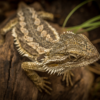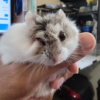People with proliferative colitis, also known as “the wasting illness,” lose half their body weight in just one week. Watery, dark feces covered in green or clear mucous are common in ferrets that are sick. Ferret rectal tissues may prolapse in some circumstances, and the tissues may not return to their normal form for several hours, or possibly for days, due to the condition If proliferative colitis is not treated in a timely manner, the ferret is expected to die from the wasting condition.
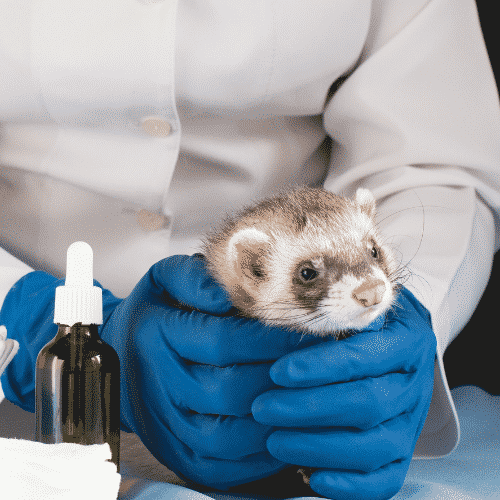
The bacteria that line the big intestine of ferrets cause proliferative colitis. The thickening of the large intestine’s lining due to infection makes it difficult for water and other fluids to pass through.
Proliferative Colitis in Ferrets – A Complete Guide
If a ferret suffers from proliferative colitis, it will lose a lot of weight quickly. In a week, ferrets may lose up to half of their whole body weight because the Lawsonia intracellularis bacteria stops the body from absorbing nutrition and flushes all chemicals from the body. Diarrhea with or without dark brown feces is the most prevalent indication of this debilitating condition. When the ferret has proliferative colitis, it’s possible that the tissues in the rectum can prolapse, or stick out. The ferret may squeak or whimper as he or she struggles to defecate in the middle of the night. Shortly after, the pet is likely to become lethargic, inactive and suffer from anemia. Depending on the situation, the pet may be unwilling to eat, participate in activities, or communicate with the ferret owner at all. The following are other clinical symptoms in ferrets that are connected with proliferative colitis:
- Alopecia (hair loss)
- Pale mucous membranes
- Weight loss
- Abdominal pain
- Melena (an indication of bleeding in the stomach, as the stool gets its dark, tarry color from digested blood)
- Diarrhea
- Dehydration
- Weakness
- Anorexia
- Mucus covered stools
- Green, frothy stools
- Lethargy
Causes of Proliferative Colitis in Ferrets
Lawsonia intracellularis, a pathogen that causes ferret wasting sickness and proliferative colitis, is to blame. The fecal-to-oral method of transmission is used to spread this pathogen, which is deposited in the feces of an infected ferret and ingested by another ferret. Because the bacterium is able to flourish in filthy conditions, ferrets in those environments are more likely to become infected. It is especially common in infant and elderly ferrets, as well as those with weak immune systems.
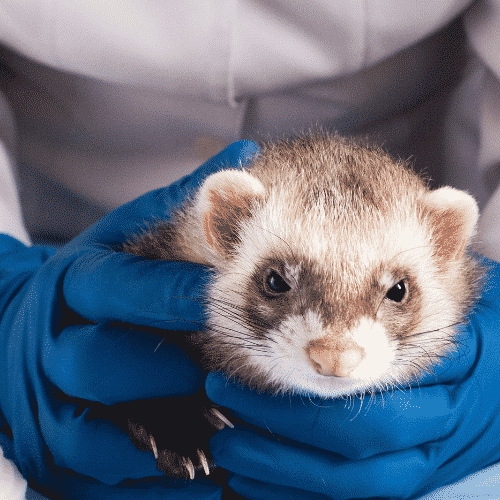
Diagnosis of Proliferative Colitis in Ferrets
In a live ferret, there is no laboratory test that can identify this condition. Only the tissues of a deceased ferret may be used to make a definitive diagnosis of proliferative colitis; however, clinical diagnostic examinations may indicate the presence of the Lawsonia intracellular bacteria. Outside of the ferret’s abdomen, one can feel a thickening of the intestinal lining; one may also observe this thickening on ultrasound or a radiograph. Proliferative colitis can be diagnosed by the veterinarian using the results of these diagnostic tests. This intestinal irregularity in the ferret may also require a fecal inspection, a fecal flotation test, and blood testing to rule out any other probable causes.
Treatment of Proliferative Colitis in Ferrets
Intravenous fluids will be administered by the vet to the ferret to treat dehydration brought on by the fever. The ferret’s electrolyte abnormalities and hypoglycemia will also be treated by this fluid therapy (decreased levels of glucose). Chloramphenicol, administered either subcutaneously or intramuscularly over the course of ten days, will be prescribed by the veterinarian. Proliferative colitis in ferrets is also routinely treated with metronidazole, which is administered for ten to fourteen days to pets.
Recovery of Proliferative Colitis in Ferrets
If ferrets are diagnosed and treated early, they can make a full recovery. The ferret’s weight will return in a matter of days if the proper therapy is received. To prevent re-infection, thoroughly clean the area where the ferret lived, focusing on the litter box. A ferret’s waste contains the pathogen that causes the disease, thus it is imperative that the litter pan be kept clean throughout the course of treatment and for a period following it. Treatment of all ferrets with this gastrointestinal condition is necessary if there are multiple ferrets in the household.
Common Ferret Digestive Problems
Eosinophilic Enteritis
Symptoms of this condition appear to be caused by a gastrointestinal sensitivity to an unknown substance. This could be an allergic reaction to food, bacterial sensitivity, a parasite reaction, or even an adverse reaction to substances found naturally in the ferret’s body. The liver, respiratory tract, lymphatic system, and isolated eosinophilic infiltrates may also be involved in the multi-systemic eosinophilic illness. It’s not always clear what causes this illness, but most instances respond well to medicine. If you stop the medication, some ferrets will develop an inflammatory gut condition, while others can be safely weaned from it.

Lymphocytic Plasmacytic Enteritis
Eosinophilic enteritis, on the other hand, has been around for a long time. The symptoms are comparable to those of eosinophilic enteritis, however, only glucocorticoids have a limited impact on the condition. Multiple factors may play a role in determining the cause of an illness. On immunohistochemistry staining of intestinal biopsy sections, viruses of ECE and/or Helicobacter m. are frequently found. IBD is generally thought to be caused by a decrease in the body’s ability to tolerate the antigens it is exposed to. Food, germs, autoantigens, and other things can serve as antigens. Intestinal bacterial overgrowth, stomach Helicobacter ulceration prevention, and modulation of the GI immune response are all goals of treatment.
Ferret Going Crazy In Cage? A Complete Guide To Cage Rage In Ferrets
Helicobacter Mustelidae
Most ferrets are probably infected with Helicobacter m. Helicobacter gastritis can produce stomach ulcers and bleed, which can lead to denatured blood in the vomitus or stool. Palpating the stomach of one of these ferrets usually results in excruciating agony. Food aversions are prevalent, and so are bruxisms. If anything, a heightened awareness of the occurrence of Helicobacter m. enteritis (partly due to research on the pathophysiology of the same bacterial genus in human gastric ulcers) and an increase in histology submissions are causing an increase in its prevalence.
Adult ferrets are most commonly affected, however cases of the disease in adolescent ferrets have been documented as well. A concomitant condition, such as insulinoma or adrenal illness, can often hasten the onset of an infection’s clinical manifestations through stress. Some of these ferrets may be showing signs of distress, such as twitching of the face and ear muscles and pawing at the mouth. A mixture of antibiotics may be used.
Marshall Ferrets Lifespan – How Long Do Marshall Ferrets Live?
E.C.E. (Epizootic Catarrhal Enteritis, Corona Viral Enteritis, or Green Slime Disease)
This type of virus is most likely to blame for this illness, but there is no vaccine against it at this time. Many rescued ferrets have developed an apparent latent carrier condition, which appears to last indefinitely. Ferrets who had previously recovered from the disease have shown signs of relapse after a relapse. Severe, fluorescent, watery, bright green diarrhea is a common symptom after contact with a newly introduced, but otherwise healthy, ferret. In ferrets that are young and healthy, there is no need for therapy other than supportive care. Elderly ferrets with underlying health issues are particularly vulnerable to dehydration, emaciation, and even death. The disease is very contagious, and the incubation period is extremely brief.
Clostridial Diarrhea
In ferrets, Clostridial bacteria overgrowth is fairly common. It’s not uncommon for diarrhea to have a strong odor. Clostridial overgrowth is rarely seen in healthy ferrets, but it is more common in older ferrets with metabolic or gastrointestinal problems (i.e. previous ECE, Helicobacter, IBD, adrenal disease or insulinoma episodes). In Gram’s stain, Clostridium can be identified by the presence of bipolar or “safety pin” staining rods. Most ferrets’ overgrowth and clinical diarrhea may be controlled with medication, although recurrence is not uncommon with this condition.
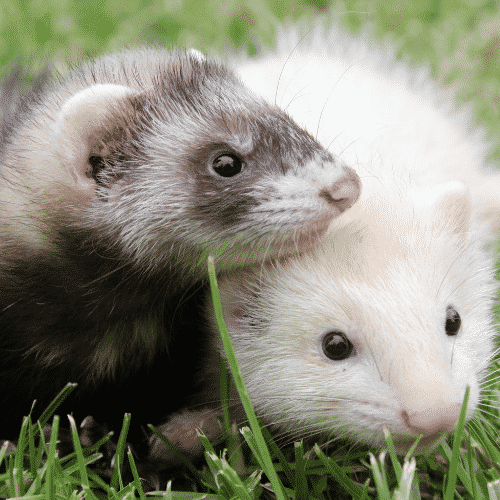
It’s possible that a variety of non-gastrointestinal conditions can induce symptoms including diarrhea, anorexia, nausea, and vomiting. renal failure, liver illness (including fatty liver and lymphoma), insulinoma, systemic infections, and autoimmune diseases are just a few of the conditions that can lead to kidney failure and death.
Ferret Poop Chart – UPDATED 2022 – A Complete Guide With Pictures
Ferret Mucus Poop – What It Means?
Even though yellow ferret excrement can be normal, you should keep a watch on your pet just in case. Perhaps the last meal, especially if you fed it an egg, caused his waste to be yellow. As a result, there is nothing to worry about. Wait for your ferret’s second poop to make sure you’re safe. There’s no need to worry if the second poop is just typical ferret poop.
When yellow feces are mixed with nasty ferret poop, trouble ensues. It is possible that ferrets with yellow liquid poop have ECE, as evidenced by the ferret poop that is green in color. Keep a watch on your ferret and separate it if you have other ferrets if there is no other indication.
The digestive system may also be to blame for yellow stool. The digestive system of your ferret may not be working properly if it does this. It can happen only once or again. Ask your veterinarian for help if this happens on a frequent basis. Changing your ferret’s food may be the best option for him or her.
Ferret Pooping Blood? Here’s What to Do
Ferrets with intestinal illness, particularly near the anus and rectum, will have blood in their feces. Most of the time, the term “injury” is used to describe some sort of bodily harm, requiring treatment from a veterinarian. One of the “damages,” a prolapsed rectum, is clearly visible.
Fecal matter is distinct from that of black ferrets since the blood hasn’t been digested. When ferrets have bloody feces, there is frequently pain and difficulty defecating.
Red excrement is harmless when ferrets eat food dyed kibble. If your ferret’s defecations show signs of pain, you should investigate further and make sure the food you’re giving him is safe. You won’t have to worry about dyes in the best kibbles.
Understanding Waardenburg Syndrome In Ferrets – A Complete Guide
Conclusion
Again, IBD cannot be “cured” in most ferrets, but it can be treated. Be patient with your veterinarian’s treatment suggestions and closely follow any dietary advice he or she gives you. A yearly exam is often required for individuals who have been stabilized.

Veterinarian (DVM, MS) Content Writer, Blogger, and WordPress Developer. Working as a pet/animal/bird/fish/reptile/wildlife writer for the past 7 years on many renowned platforms.
